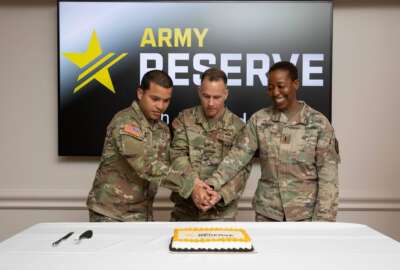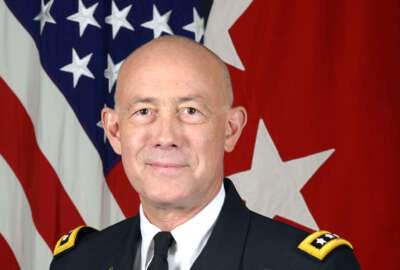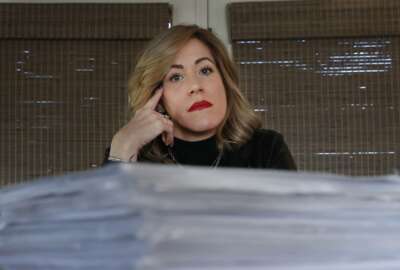Meet the overachieving and high-flying Army Reserve major
Maj. Kate Rubins became the first Army Reserve officer to receive the Basic Aviation Badge with Astronaut Device and Space Badge.
Recently, Maj. Kate Rubins became the first Army Reserve officer to receive the Basic Aviation Badge with Astronaut Device and Space Badge. Just tack it on as another accomplishment for her. In her main job, Rubins is a microbiologist and NASA astronaut. She spoke to Eric White on the Federal Drive with Tom Temin to discuss her story.
Interview transcript:
Kate Rubins: I definitely have an identity crisis. I’ve got a lot of identity. So I’m a I’m a scientist. I’m a soldier. I’m an astronaut. I’m also like a gardener and a reader. So I do kind of get made fun of sometimes because people say I’ve got about six jobs, but I really love what I do. And these jobs, to me, very overlapping and complementary. A lot of the skills that I’ve learned being an Army Reserve soldier are very directly applicable to being an astronaut. So I would call it a blended identity.
Eric White: Can you give me just one example about how they overlap and where you were able to implement some of the skills you learned from one trade and bleed it into the other?
Kate Rubins: Yeah, absolutely. I can give you a couple examples. So there’s a very practical and literal example of land navigation. So, you know, a big part of the Army, the move part of shoot, move and communicate. And so we do a lot of land navigation training. What people probably don’t know is that this is also important to our NASA job. So NASA’s returning to the moon. We’re sending astronauts to the south pole of the moon. We’re very interested in going into unexplored regions there, permanently shadowed craters. One of our biggest challenges is that we don’t have GPS on the moon. We don’t have satellites in orbit around the moon that can give us our location. We don’t even get a chance to use a compass because the moon has no magnetic fields. And so we need to do land navigation based on terrain association. And so a lot of the skills that I have learned in my duties as an Army Reserve soldier are just immediately transferable over to our NASA mission. I think maybe a less tangible example is this idea of working in a small team, leading people and accomplishing a mission with a small number of people where there’s a lot of unexpected things that may happen. So we try to mitigate that by doing all of this training. We prepare, we understand ourselves and our equipment, but then we’re faced with the mission. Things change. We need to improvise and we need to rely on the people around us. That’s very similar to a space mission. So very similar. We go through years of training. We’re in this dedicated team of professionals and stuff happens in space. It’s going to just throw one thing at you after another. And so those same kinds of skills that you would use in both cases. They really augment each other.
Eric White: Yeah. In speaking with other astronauts with military backgrounds and they’ve said the same thing along similar notes, that it’s that heightened sense of awareness, whether you’re on a Navy ship or you’re in the space station, there’s an intensity that always goes around and a heightened focus that you have to maintain the entire time since it’s one air hole away from things going sideways there on you.
Kate Rubins: Yeah, absolutely. And you could be called into immediate action at any time. So you need to be ready. Talking with your teammates really helps. Also, making sure that you’re taking care of yourself, that you’re not too exhausted and tired to be able to get up at 2 in the morning and fight a fire if you need to. Really understanding everything that you could be called upon to do and keeping that fresh in your mind. So as an example, when I was in my crew quarters at night, every night before I went to bed, I would visually as I’m closing hatch windows and turning off lights, I would look at the exit paths and all of the places where we had emergency firefighting equipment and then our masks to prevent if we have an ammonia contamination that way that path is just in my mind before I go to bed. And so you can see how that would be kind of similar to like looking at your equipment and thinking about what you’re going to do, what immediate steps you’re going to take if you’re called into action in the middle of the night.
Eric White: Yeah, both situations where a person like myself probably wouldn’t be getting much sleep. So the training is definitely important there. All right. So you are the first Army Reserve officer to receive the basic aviation badge with astronaut device and SpaceX badge. What is the significance of that? And what does that mean to someone like yourself who likes to be a jack-of-all-trades?
Kate Rubins: I mean, it’s an incredible honor. I just blown away by receiving this honor, but it’s really not about me. I think what this is recognizing is really the work that we do in both agencies. And for me, I just think it’s a great example of what it’s like to be in the Army Reserve. The fact that you can have this civilian job and you can have your Army job at the same time and that they’re augmenting each other and complementing each other. I just think the fact that it’s the first award is, for me, a great way to talk about how cool it is to be a citizen soldier. And maybe it sounds cheesy, but I love what I do in the Army so much. And so for that to get recognized, I think maybe people out there who are professionals who are who are in their lives, in their career and doing their work, wouldn’t really necessarily think about joining the Army at a later stage in life. But I did I signed up for the Army very late. And I think it just goes to show that this work with both of these areas is being recognized.
Eric White: Let’s go down just both the paths that you took, the first one being that you were a NASA astronaut. How did you get into that? It’s not something you fall into, I imagine. What can you tell me about your steps that you took to get there?
Kate Rubins: Yeah. So my background is I’m a scientist and I had studied biodefense like viruses that are of biodefense concern, for example, smallpox, Ebola, Marburg. I had studied those while I was completing school, and then I had a lab at the Whitehead Institute. And I was also studying those viruses there. As I was doing all of this work, I was really doing this in conjunction with the U.S. Army Medical Research Institute of Infectious Disease, known as USAMRIID. That’s up in Fort Detrick, Maryland. So the places that I had my lab or that I was doing school didn’t have the high containment labs that we needed to work with these viruses. And so I was always working hand in hand with the Army as a civilian scientist. So that’s where I really got to understand Army research and what we’re doing to protect soldiers and all of the research that we’re doing for biodefense. I kind of took a hard right turn and applied to be an astronaut. This was not really something that I thought was ever feasible. And I sent my application and then thought, ‘Well, this will be a good story that NASA rejected me.’ And I really did not expect to hear from them. So I was quite surprised when they actually asked me to come in for an interview. So I started in 2009 with NASA as a member of the 20th astronaut class and then on the reserve side of things. So I was with NASA for I think it was 13 years on my second spaceflight and I had been thinking about what I was going to do when I came back. And this is something that I knew I needed to think about because as you said, there’s an intensity to the training and to the mission. So you’re training for two and a half years for your mission before you go on your mission, and then you’re in your mission for six months and then you come back and NASA says, ‘This has been so intense like you need to take the time in order to recover physically and you need to recover. Just kind of get back into your normal life because you’ve been spending three years really training and going on this incredibly intense mission.’ And I knew from the last time that when I came back, I needed something meaningful to do. NASA takes a step back and says, ‘It’s OK, go take care of yourself.’ And I didn’t want to just sit on my couch and watch Netflix for a few weeks. I mean, I did want to watch Netflix for a few weeks, but then after that, I really wanted something to do. So I was looking for some way that I could contribute because I also had felt like my government had invested so much time and money in me and gave me all these opportunities. And I was so incredibly grateful for the training, the opportunity to find space, the opportunity to work with these incredible astronauts. Right. And I can never pay that back. It costs a lot of money to do astronaut training. But I do have time and I felt like I could serve in that. So those two ideas came together and that sounded like” a really great idea. But then I was thinking, ‘Well, I’m probably too old for this.’ So from my crew quarters on the space station, I was looking up the Army recruiting website, goarmy.com, from my SpaceX crew quarters. And I looked and tried to figure out where my skills would fit and figured out what my MOS would be and realized that if I sent my packet in, I would get in right under that age deadline and wouldn’t have to apply for an age waiver. So I started the application process from space.
Eric White: That’s incredible. All right. And so you’re with the Army Reserve now. You’re a member of the 75th U.S. Army Reserve Innovation Command. What can you tell me about what that command’s role and mission is and how you contribute to it?
Kate Rubins: Yeah. So this command is set up in about 2019. Fairly new. And really the goal and the mission of this command is to foster innovation within the U.S. Army Reserve. And so what that looks like is taking people who are doing things in their professional life that are really relevant to Army skills. So, for example, in my unit we have things like AI and machine learning, cyber autonomy, energy. I’m in the medical and biotechnology group. So all of these are areas that are dealing with this kind of cutting-edge technology and research. And what we’re doing is taking people who are professionals, who are cybersecurity at Google, for example. And they’re bringing all of those skills and things and education and things they’ve done in their professional life into working with the Army Reserve, identifying problems, identifying things where we need to push technology or innovation forward, and then coming up with solutions. And we can do these not just in our own individual areas, but for example, we can put together cross-functional teams. So if I have a project that’s looking at synthetic biology and I need somebody who’s got AI experience, we can pull back together in the team. And so really we’re taking civilians that have all of these skills and education along with people that have functional military experience. And so there’s a lot of military experience among our Army Reserve soldiers in the 75th. And we basically are just applying that to push the technology forward to figure out what the United States Army Reserve needs, how can we contribute, what do we need to do in the future and how can we solve problems or deliver better technology or make things go faster?
Copyright © 2025 Federal News Network. All rights reserved. This website is not intended for users located within the European Economic Area.
Eric White is news anchor and Federal Drive producer at Federal News Network.
Follow @FEDERALNEWSCAST






